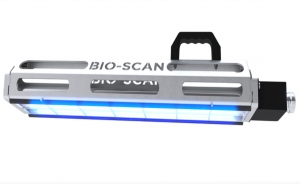


(Posted on 02/06/20)
BIO-SCAN, the UV-C-based surface disinfectant system announced last month by BIO-UV Group has now received certification from two independent testing laboratories.
The UV-C virus scanner, which is capable of detecting and eradicating micro-organisms including SARS-CoV-2 from all types of surfaces, is now being marketed across a number of industry sectors, though priority will be given to health care professionals.
It adopts the same UV technology as that used to wipe out invasive species found in ships’ ballast water tanks.
Biofaq Laboratories, a division of CARSO Group, a European provider of environmental and agri-food testing services, and C4 Diagnostics, a French biotech specialising in diagnosing infectious diseases, issued the certification based on the internationally recognised standard NF T72-281.
The tests indicate that BIO-SCAN is effective in killing 99.99% (1/10,000) of viruses and 99.999% (1/100,000) of bacteria on surfaces in just eight seconds.
“The performance achieved during these two stringent tests is remarkable,” said BIO-UV Group’s founder and CEO Benoit Gillmann. “Test results validate BIO-SCAN’s capacity to disinfect and inactivate all types of micro-organisms, including the coronavirus, using UV-C technology.”
Placing BIO-UV Group amongst a very limited number of companies that have achieved certification for a surface-disinfecting system, the 50cm handheld device emits a ray of UV-C which is passed over a surface, taking only seconds to disinfect the scanned area.
Almost all hygiene and disinfection procedures are typically carried out using chemicals, primarily bleach, alcohol, formaldehyde, and quaternary ammonium. Some of these methods are hazardous to health and the environment, and the protocols currently in place increase the dosages, which can impact materials on contact and even expose people close to these chemicals.
UV-C rays only require the operator to use eye or skin protection. They are chemical-free and without side effects.
“The current health crisis and social distancing initiatives led us to adapt our UV-C technology to protect workers from picking up the virus from surfaces and to ensure they are working in safe, virus-free environments,” said Gillmann, adding that UV-C disinfection technology has been around for a long time.
It was invented in Marseille, France, in 1904. However, its application was limited until recently, when it emerged that the technology is highly effective in killing pathogens and organisms in water systems, such as ship’s ballast water.
BIO-UV Group has already received orders for the system and is establishing distribution channels for export.
“We will further develop BIO-SCAN to treat larger volumes and surfaces and adapt the system for use in mass transport systems, but for the moment we are prioritising medical and paramedical professionals (hospital staff, community doctors, nursing homes, dentists, physical therapists, firefighters, and paramedics). It will also be made available for other sectors and industries,” said Gillmann.
The shipping industry is a likely beneficiary as it can be used on bridge and navigation instruments and in crew and passenger cabins, among other areas.
Gillmann added: “We are currently developing several products to meet the specific needs of each of these markets. In addition, our subsidiary TRIOGEN is developing an ozone-based disinfection system for damp surfaces.”
As announced in April 2025, Samuel Schär has assumed his position as CEO of Bühler, effective... Read more
Leading vessel performance platform Smart Ship Hub says the industry should expect a breakthrough year... Read more
The Nordic countries are taking an important step towards decarbonising maritime transport with the... Read more
Germany’s Steelpaint has appointed ADD Marine as its representative for Greece and Cyprus, strengthening... Read more
Rio Tinto’s first Pilbara-made iron ore rail car has rolled off the production line in Karratha... Read more
Precision meets progress at Phu My Port, Vietnam. The LPS 550 has been deployed to handle bulk commodities... Read more
bound4blue, a global leader in wind propulsion systems, has expanded its industrial footprint in Asia... Read more
As the industry explores multiple decarbonisation pathways, methanol is gaining attention as a practical... Read more
Technology group Wärtsilä will supply an integrated hybrid propulsion system for a bulk carrier... Read more
Superior Industries, Inc., a US-based manufacturer and global supplier of bulk material processing and... Read more